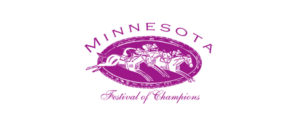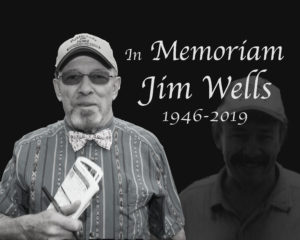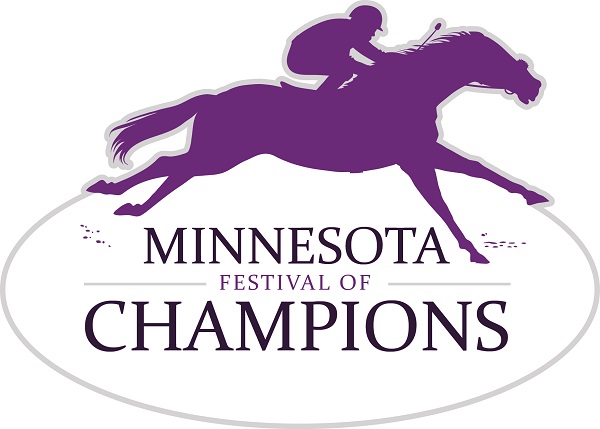by Jim Wells
[Canterbury Park Hall of Famer and historian Jim Wells passed away last fall. He wrote countless stories about racing for the St. Paul Pioneer Press and later for CanterburyLive. This story by Jim, published a decade ago, recounts the efforts of those that were determined to keep horse racing alive in Minnesota.]
The meeting took place in a Woodbury restaurant over rice, burritos and chimichangas, and the ideas were flavored with details as savory as the victuals on the table. The plan was to send a message to the Minnesota horse industry and the owners of the state’s only parimutuel facility that there was still a market for horse racing in Minnesota, that live racing was not in a state of rigor mortis despite the lowest purses in track history and facility owners that refused to promote the sport or invest another dime.
The three men at the table gathered the contents of their discussion as if they were filling a doggie bag and departed, eager to discuss the matter with others. This was something that had to be done right and on a scale theretofore not seen at Canterbury. It had to be the whole enchilada or nothing – a day devoted exclusively to Minnesota’s horse owners, breeders and horses.
When the idea was presented to the Ladbroke Racing Corp., the local managers responded as if they had been served a plateful of jalapeno peppers and were choking on their heartburn.
“They were rolling their eyes,” recalled horsemen Steve Erban, who proposed the lunch and Festival plan to Randy Sampson, the future president of the racetrack, and Dan Mjolsness, the executive director of the Minnesota Thoroughbred Association at the time.
When Erban informed management that horsemen wanted to stage a festival for Minnesota horsemen a week after closing day at The Downs (as it was known under Ladbroke), there was a different response.
“They started howling,” he said.
Yet, with the widespread support of the industry and significant contributions from key individuals, the first Festival of Racing was conducted at Canterbury Downs on September 12, 1992. A committee was formed comprised of Gordy Bredeson, Al Burdick, Joe Friedberg, Gerry Herringer, Kathy Kissoon, Phil Maas, Jim Druck, Dale Schenian and Sampson, with Erban and Mjolsness as co-directors. Maas underwrote the cost of televising the event on Channel 9, musicians strolled the walkways and a crowd in excess of 11,000 people showed up.
“It was kind of a last showcase for Minnesota horses,” said Mjolsness.
 As it turned out, the Festival would become an annual showcase for the people who never lost faith in the industry: Art and Gretchen Eaton, Al and Marlys Goebel, the Sampsons, Valenes, Metzens, Kissoons, Casbys, Morehouses, Dahlbergs and countless others.
As it turned out, the Festival would become an annual showcase for the people who never lost faith in the industry: Art and Gretchen Eaton, Al and Marlys Goebel, the Sampsons, Valenes, Metzens, Kissoons, Casbys, Morehouses, Dahlbergs and countless others.
“I think it’s one of the most fun and exciting days of the year,” said Marlys Goebel. “It’s always exciting for the fans and the people competing because there’s always a packed house that day.”
There are always the memories, too. For the Goebels, it is perhaps the victory by Careless Navigator in the 2004 Northern Lights Futurity that is most memorable. “That was a very special day,” Marlys said.
That special day and special days for numerous other owners and breeders started on that September afternoon 19 years ago when a dark cloud hovered over the industry and the sport of horse racing.
“Ladbroke, in context, was saying that this was the end of the road for racing in Minnesota,” said Sampson. “They had thrown in the towel on promoting racing or doing much to make it successful, and we were trying to demonstrate that there was still interest in racing here.”
Ladbroke’s unwillingness to guarantee live racing for the following season met with a chilly response from the Minnesota Racing Commission in the winter weeks of 1992 that followed. In December, the Commission refused to renew the English company’s license and Canterbury Downs closed its doors.
Yet, on the final day of racing in 1992, the Festival of Champions energized the industry and racing public, demonstrated that Minnesotans still enjoyed the sport, and provided hope for the future. That first Festival did more than produce winners named Bold Sharokee, Northern Injun, Belle of the Night, Timeless Prince, and Silver Me Timber. The Festival of Champions, the annual tribute to the state’s horse industry, provided the kind of spirit and resolve that returned racing to Minnesota in 1995.

